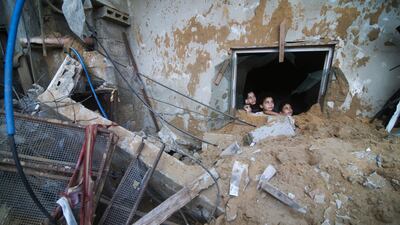Live updates: Follow the latest news on Israel-Gaza
Scores of ambulances and lorries laden with humanitarian supplies were poised to cross into Gaza on Monday, after 10 days of relentless Israeli air strikes that have killed 2,750 Palestinians, displaced one million and pulverised entire neighbourhoods in the coastal enclave.
The movement of the supplies into Gaza was supposed to be made possible by an agreement negotiated by Egypt, the US and Israel on a ceasefire scheduled to begin at 9am on Monday, but Israeli Prime Minister Benjamin Netanyahu denied a truce had been put in place, in a statement on X, formerly Twitter.
"There is currently no ceasefire and humanitarian aid in the Gaza Strip in exchange for the expulsion of foreigners," read a statement by Mr Netanyahu's office.
A Hamas official, Izzat El Reshiq, also denied that a truce was in place, Reuters reported.
Egyptian officials said the aid convoy was expected to start moving at 7am or 10am local time, depending on the ceasefire.
There was no word of any movement by early evening, though the large convoy remained in place in the border town of Rafah and the nearby city of Al Arish, both in the northern part of Egypt's Sinai Peninsula.
The Egyptian officials said four lorries laden with fuel and flying the UN flag moved late on Monday morning to the Egyptian side of the border, but stopped before they reached the Gaza side, which was bombarded at least three times by Israel last week.
They said the lorries were ordered to quickly pull back, together with other nearby vehicles, after what appeared to be an Israeli air strike shortly before nightfall that hit the Gaza side of the crossing.
There was no immediate confirmation whether the crossing was damaged or there were any casualties.
According to the reported agreement, foreign citizens trapped in Gaza by the violence would be allowed to cross into Egypt. There was no word immediately available on their number or nationalities but they are believed to include Europeans and Americans.

US authorities have told American citizens in Gaza to move closer to the crossing in the south of the coastal enclave. There are an estimated 500-600 US citizens in Gaza, many them dual American-Palestinians.
Egyptian officials said scores of foreign citizens had gathered with their belongings on the Gaza side of the border early in the morning in the hope of crossing into Egypt.
Egyptian Foreign Minister Sameh Shoukry on Monday said the Israeli government had yet to take a stance that allowed the Rafah crossing to reopen.
Mr Netanyahu's apparent rejection of a ceasefire put on hold a plan to allow humanitarian supplies into Gaza, which Egypt, Israel and the US had been discussing, according to the Egyptian officials.
US Secretary of State Antony Blinken reportedly struck the deal with Egyptian President Abdel Fattah El Sisi in talks in Cairo on Sunday, the officials said.
Mr Blinken was back in Israel on Monday for the latest stop in a whirlwind regional tour that also took him to Jordan, Bahrain, Saudi Arabia, Qatar and the UAE. He met Palestinian President Mahmoud Abbas in Amman, Jordan.
Israel had earlier rejected Cairo's proposals to send aid supplies to Gaza and imposed a blockade of the entire coastal enclave, denying its 2.3 million residents water, fuel and electricity.
It warned last week of military action against any attempt to take humanitarian supplies into Gaza without approval.
Israel's hard-line is juxtaposed with growing shortages of fuel, water and medical supplies in Gaza while it prepares for a potentially devastating ground offensive.
The Egyptian officials said Cairo wanted approval from Israel to send humanitarian aid in return for it allowing the foreign citizens trapped in Gaza to cross into Egypt.
Israel's air strikes in Gaza are being carried out in retaliation for an attack on October 7 by Hamas militants from the Gaza Strip in southern Israel that killed more than 1,300 people, mostly civilians, and injured thousands. It was the bloodiest day in Israel's 75-year history.
Residents in Gaza said overnight air strikes were the heaviest yet since the war began, and continued until Monday morning.
US President Joe Biden, who has expressed Washington's unwavering support for Israel and sent it military aid, also stressed the need to get humanitarian aid to Palestinian civilians. He urged Israel to follow the rules of war in its response to the Hamas attacks.
Near the Rafah border crossing, Al Arish airport on the Mediterranean has been receiving planeloads of relief supplies from donor nations and UN agencies.
According to the Egyptian Red Crescent, more than 2,000 tonnes of aid supplies are currently stored at the airport. It has come from Egypt, Turkey, Jordan, Tunisia and the UAE, with the involvement of the UN World Food Programme and Unicef.
Supplies include food, blankets and medical items, such as blood storage units.
Some of the lorries laden with aid bore an image of the Egyptian President on their side.
Egypt and Israel signed a peace treaty in 1979, but their relations have often been hit by bouts of tension over what Cairo sees as Israel's harsh treatment of the Palestinians and its reluctance to allow them an independent state in the occupied West Bank and Gaza Strip.
However, the two countries have been co-operating closely on counterterrorism and fighting human and drug trafficking into Israel from the Sinai Peninsula.
Egypt has also mediated truces to end previous wars between Israel and the militant Palestinian group Hamas, the last of which ended a conflict in 2021.
But the latest round of violence has strained relations, with Mr El Sisi telling Mr Blinken on Sunday that Israel's response to the Hamas-led attack went beyond its right to self defence and amounted to collective punishment.
Kamal Tabikha contributed to this report


